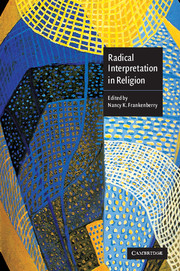Book contents
- Frontmatter
- Contents
- Notes on the contributors
- Preface
- Acknowledgments
- PART I PRAGMATICS
- Introduction
- 1 Saving belief: on the new materialism in religious studies
- 2 Radical interpretation and pragmatism: Davidson, Rorty, and Brandom on truth
- 3 Cultural politics and the question of the existence of God
- 4 Religious belief and naturalism
- PART II CULTURE AND COGNITION
- PART III SEMANTICS
- Select bibliography
- Index
4 - Religious belief and naturalism
Published online by Cambridge University Press: 13 November 2009
- Frontmatter
- Contents
- Notes on the contributors
- Preface
- Acknowledgments
- PART I PRAGMATICS
- Introduction
- 1 Saving belief: on the new materialism in religious studies
- 2 Radical interpretation and pragmatism: Davidson, Rorty, and Brandom on truth
- 3 Cultural politics and the question of the existence of God
- 4 Religious belief and naturalism
- PART II CULTURE AND COGNITION
- PART III SEMANTICS
- Select bibliography
- Index
Summary
In a characteristically fresh reading of William James's article “The Will to Believe,” Richard Rorty proposes a redescription of religious belief or faith so as to distinguish it from ordinary beliefs. Rorty wants to disengage religious faith from the inferential links by which beliefs are justified by other beliefs. He also remains committed to the holism shared by both classical pragmatists and contemporary pragmatists like Donald Davidson, according to which we attribute content to beliefs by virtue of their inferential relations to other beliefs. Rorty's proposed solution is that we identify religious beliefs not by their place in the justification of beliefs by other beliefs, but by the role they play in the explanation of human action by attributing certain beliefs and desires to the actor.
Rorty acknowledges that his proposal differs from James's in significant ways, but he thinks it captures the spirit of what James was trying to do in “The Will to Believe.” In this chapter I want to examine James's understanding of what is at stake in religious belief, show that Rorty's proposal differs more fully from James's than he suggests, and then return to assess the merits of the proposal. I agree with Rorty's conclusions about the best prospects for a philosophy of religion. I doubt, however, that the best way to achieve that goal is to draw the sharp distinctions he suggests between public and private and between the web of justifying inferences and that of the ascription of beliefs and desires to explain actions.
- Type
- Chapter
- Information
- Radical Interpretation in Religion , pp. 78 - 92Publisher: Cambridge University PressPrint publication year: 2002
- 2
- Cited by



